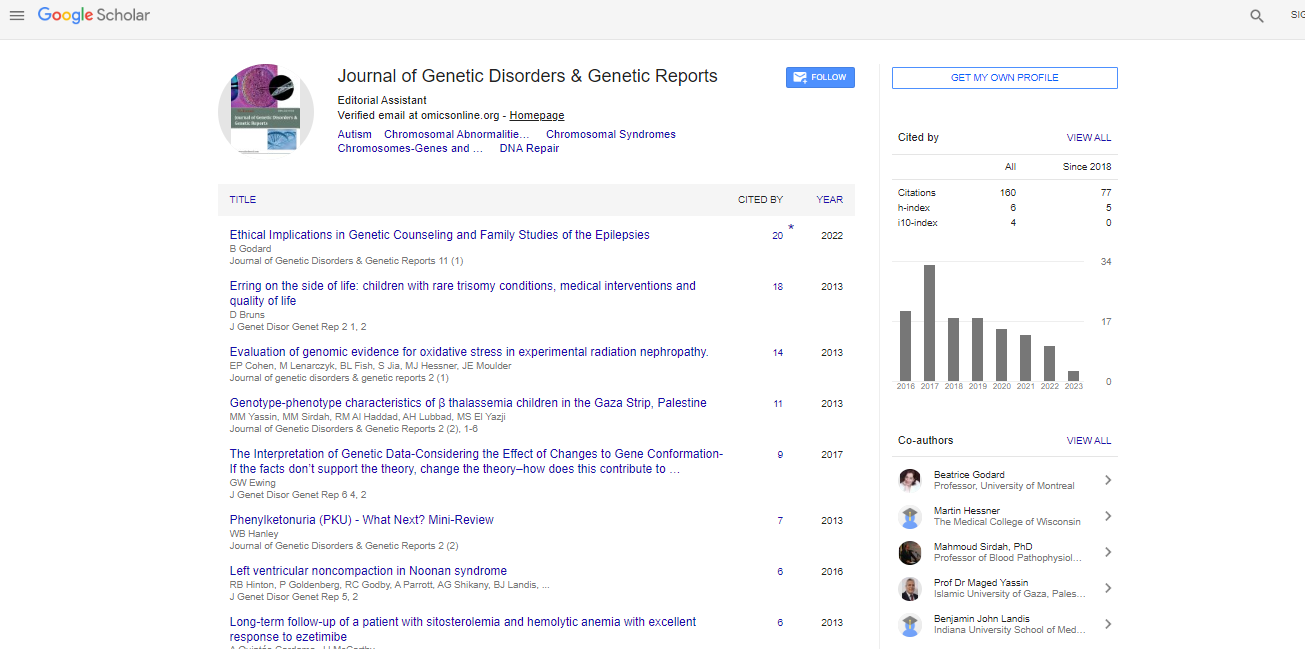Commentary, Vol: 12 Issue: 2
Genetic Predisposition: Influence of Genetics on Disease Risk
Yuin Hie*
1Department of Hematology, and the Global Health Center, Cincinnati Children’s Hospital Medical Center, Cincinnati OH 45229, USA
*Corresponding Author: Yuin Hie,
Department of Hematology, and the Global
Health Center, Cincinnati Children’s Hospital Medical Center, Cincinnati OH 45229,
USA
E-mail: YuinHie@nd.edu
Received date: 29 March, 2023, Manuscript No. JGDGR-23-99520;
Editor assigned date: 31 March, 2023, Pre QC No. JGDGR-23-99520(PQ);
Reviewed date: 14 April, 2023, QC No. JGDGR-23-99520;
Revised date: 21 April, 2023, Manuscript No. JGDGR-23-99520(R);
Published date: 28 April, 2023, DOI: 10. 4172/2576-1439.1000198
Citation: Hie Y (2023) Genetic Predisposition: Influence of Genetics on Disease Risk. J Genet Disor Genet Rep 12:2.
Abstract
Genetic predisposition refers to an individual's increased susceptibility to developing certain diseases or conditions due to inherited genetic variations. While genetics plays a crucial role in disease risk, it is essential to understand that genetic predisposition does not guarantee the development of a specific disorder. Rather, it influences an individual's likelihood of developing the condition when exposed to certain environmental factors. Genetic makeup is composed of DNA sequences inherited from the parents. Genetic variations, such as Single Nucleotide Polymorphisms (SNPs) and mutations, can influence an individual's susceptibility to various diseases. These variations can occur in genes involved in crucial biological processes, including metabolism, immune response, and cell growth and division. Genetic predisposition is not solely determined by a single gene but rather by the combined effects of multiple genetic variations. The interplay between these genetic factors, as well as interactions with environmental factors, contributes to disease risk. Understanding this complexity is crucial for unraveling the mechanisms underlying genetic predisposition.
Description
Genetic predisposition refers to an individual's increased susceptibility to developing certain diseases or conditions due to inherited genetic variations. While genetics plays a crucial role in disease risk, it is essential to understand that genetic predisposition does not guarantee the development of a specific disorder. Rather, it influences an individual's likelihood of developing the condition when exposed to certain environmental factors. Genetic makeup is composed of DNA sequences inherited from the parents. Genetic variations, such as Single Nucleotide Polymorphisms (SNPs) and mutations, can influence an individual's susceptibility to various diseases. These variations can occur in genes involved in crucial biological processes, including metabolism, immune response, and cell growth and division. Genetic predisposition is not solely determined by a single gene but rather by the combined effects of multiple genetic variations. The interplay between these genetic factors, as well as interactions with environmental factors, contributes to disease risk. Understanding this complexity is crucial for unraveling the mechanisms underlying genetic predisposition.
Genetic predisposition and disease risk
Monogenic disorders: Some diseases are caused by mutations in a single gene and follow a straightforward Mendelian inheritance pattern. Individuals who inherit these specific mutations have a high risk of developing the associated disorder. Examples include cystic fibrosis, sickle cell anemia, and Huntington's disease.
Multifactorial disorders: Many common diseases, such as diabetes, cardiovascular diseases, and certain types of cancer, have a multifactorial etiology. Genetic predisposition contributes to the risk of developing these disorders, but it is influenced by multiple genetic and environmental factors. Genetic variations associated with these diseases may have a small effect individually, but when combined, they contribute to disease susceptibility.
Heritability estimates: Heritability estimates provide insights into the contribution of genetic factors to disease risk within a population. These estimates quantify the proportion of the overall variation in disease risk that can be attributed to genetic factors. They help distinguish the genetic component from environmental influences and guide further research into specific genetic variations associated with disease.
Genetic testing and disease risk assessment
Advancements in genetic testing: Genetic testing has revolutionized the ability to assess disease risk based on an individual's genetic makeup. Various techniques, such as targeted gene sequencing, whole-exome sequencing, and whole-genome sequencing, allow for the identification of specific genetic variations associated with disease susceptibility.
Predictive genetic testing: Predictive genetic testing examines an individual's genetic profile to assess their risk of developing specific diseases later in life. This type of testing is particularly relevant for monogenic disorders with high penetrance. Examples include testing for BRCA1 and BRCA2 mutations, which indicate an increased risk of breast and ovarian cancer.
Genetic risk scores: Genetic Risk Scores (GRS) integrate multiple genetic variations associated with disease risk into a single score. GRS combine information from numerous SNPs to provide an overall assessment of an individual's genetic predisposition to a specific disorder. These scores can help stratify individuals into different risk categories and inform personalized prevention and treatment strategies.
Ethical concerns: Genetic predisposition testing raises important ethical considerations, including privacy, confidentiality, potential discrimination, and psychological impacts. It is crucial to ensure that individuals undergoing genetic testing have access to comprehensive counseling and education.
 Spanish
Spanish  Chinese
Chinese  Russian
Russian  German
German  French
French  Japanese
Japanese  Portuguese
Portuguese  Hindi
Hindi 



